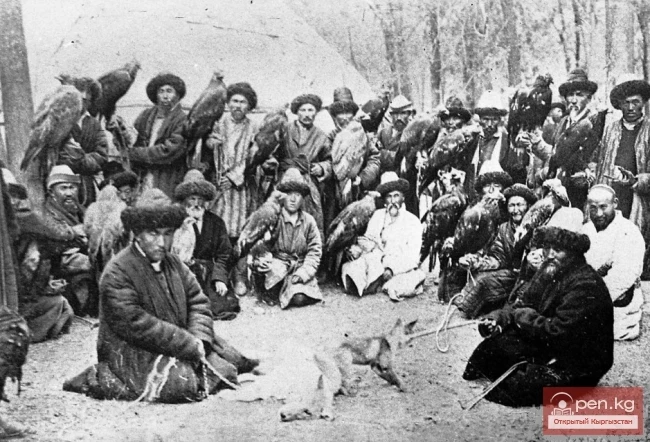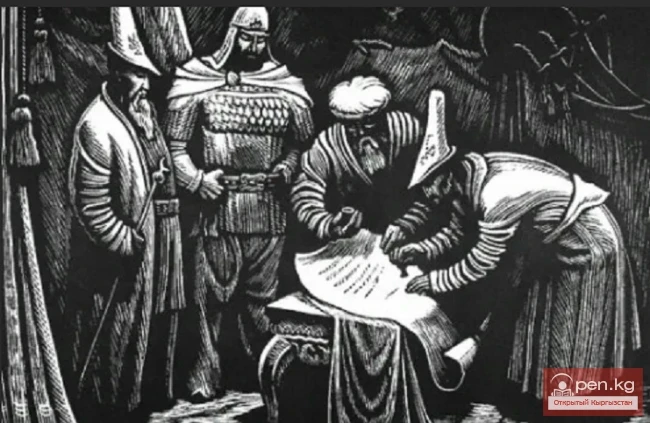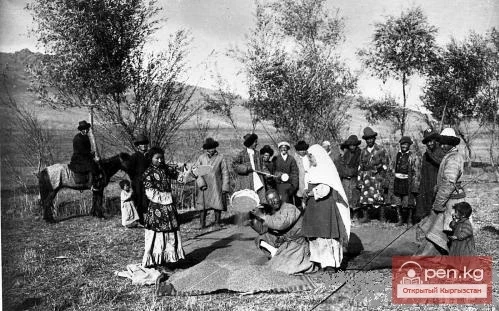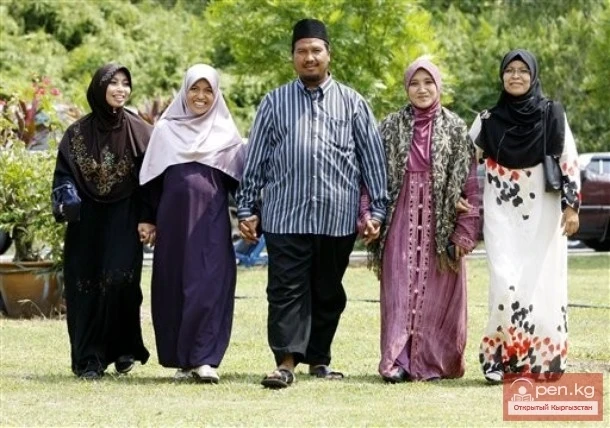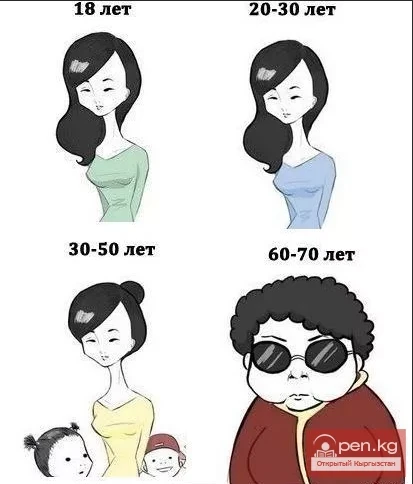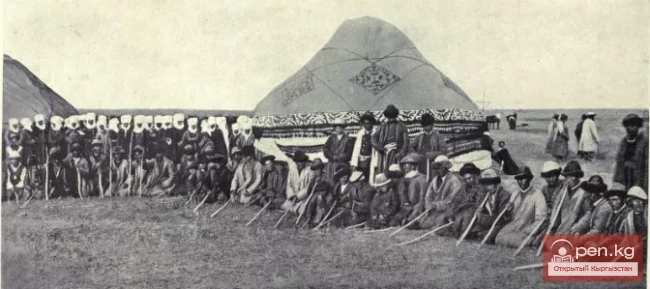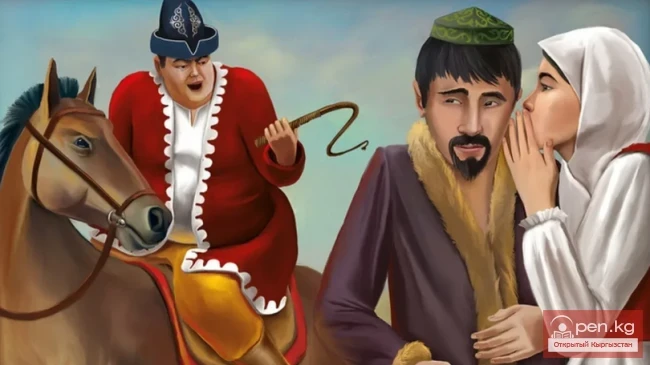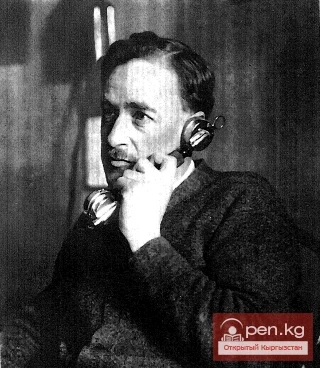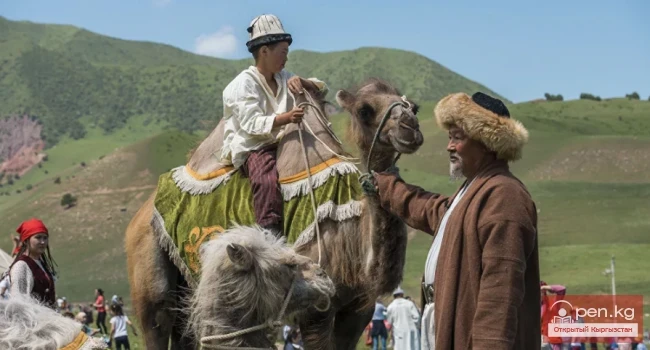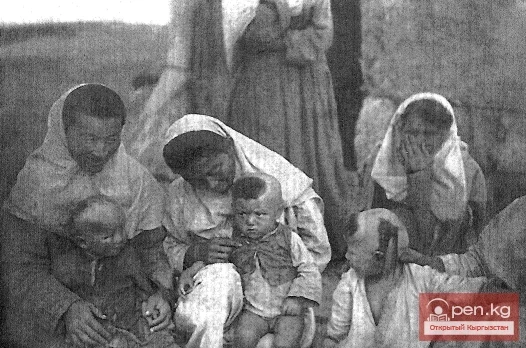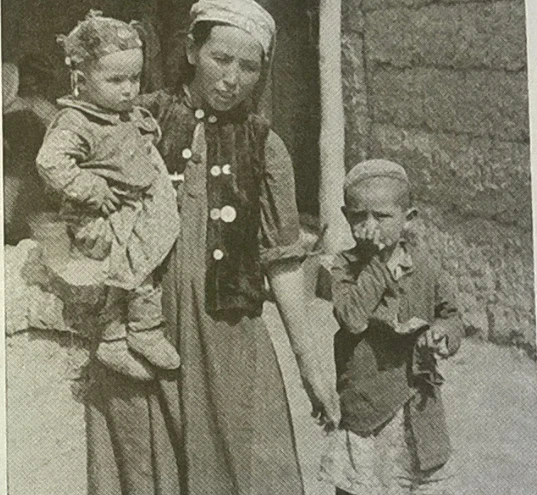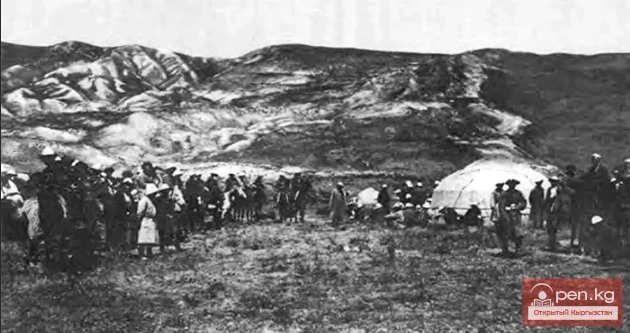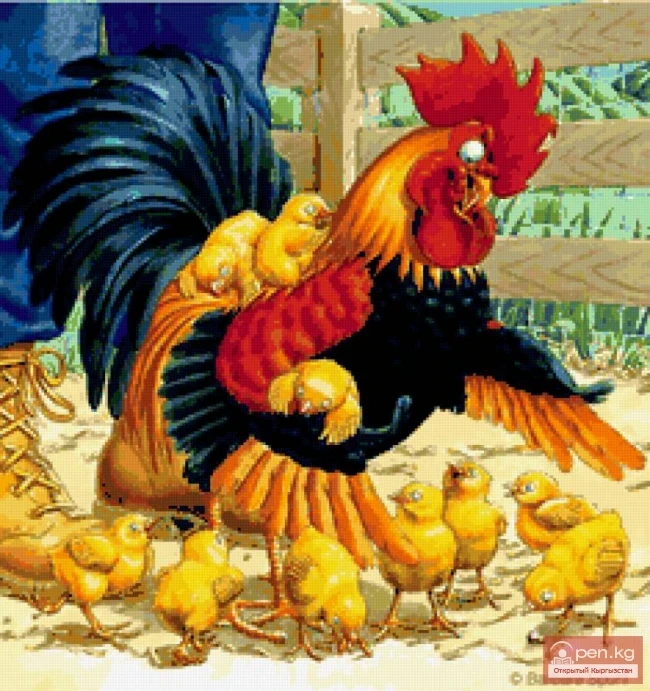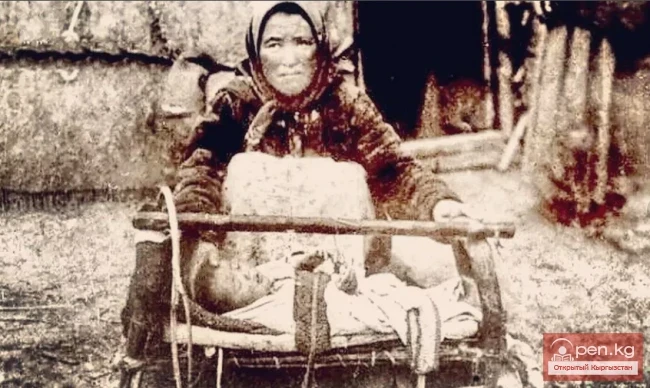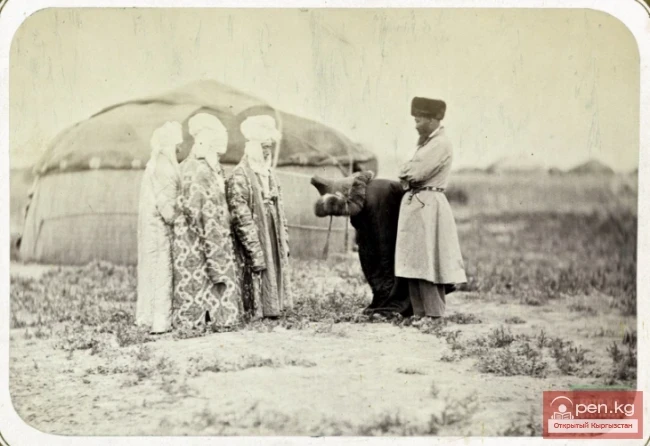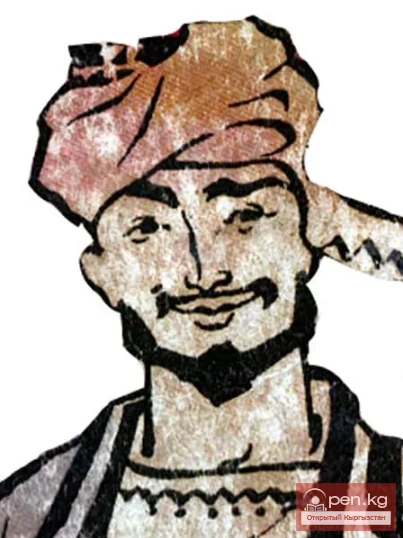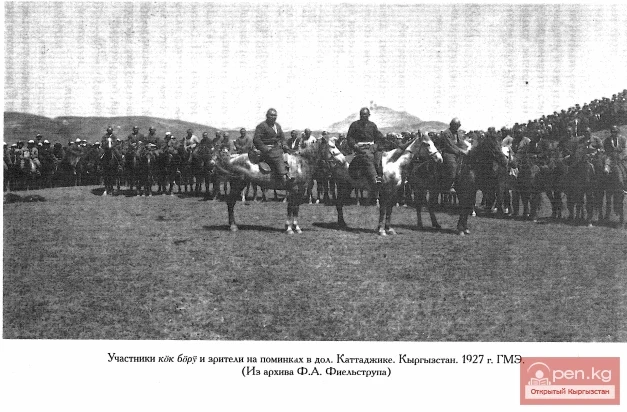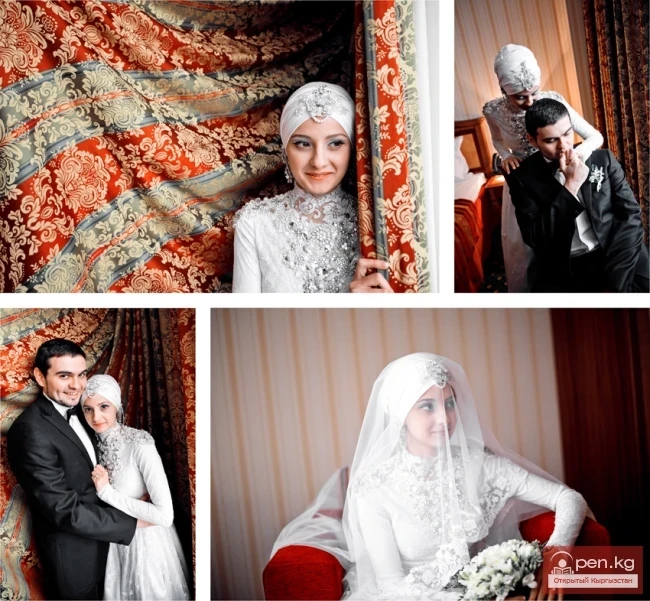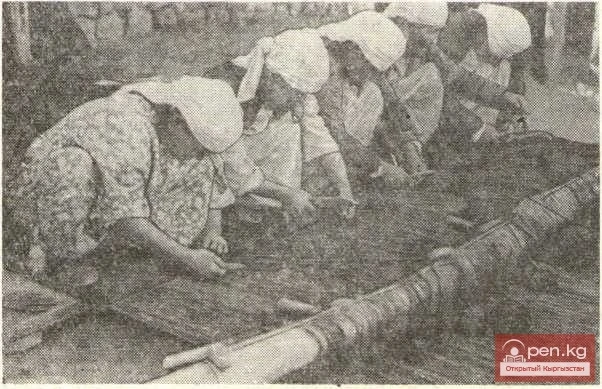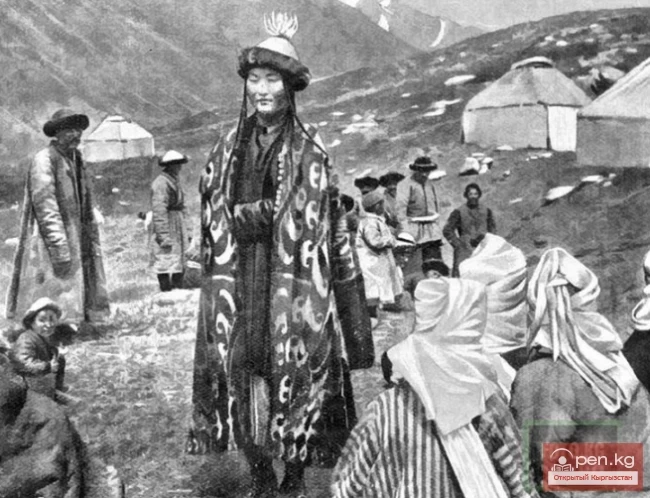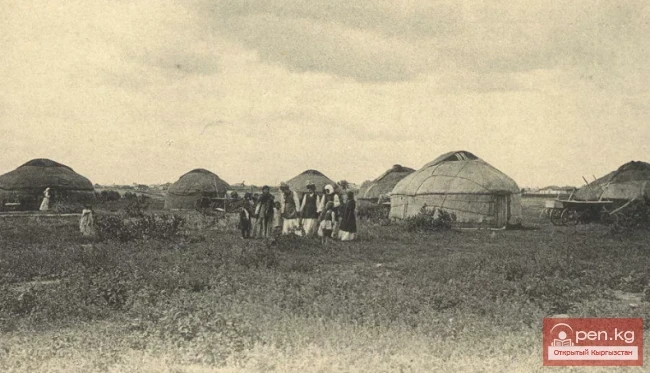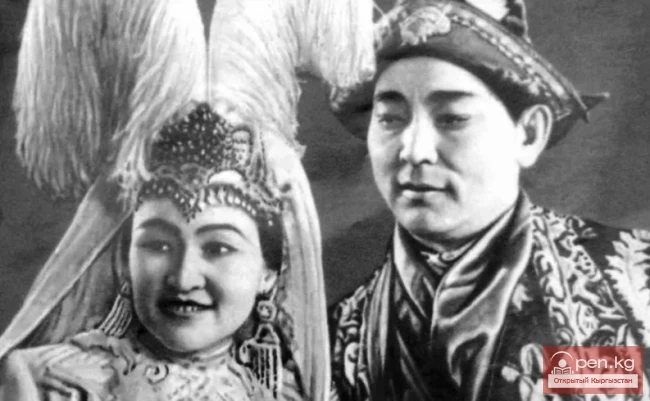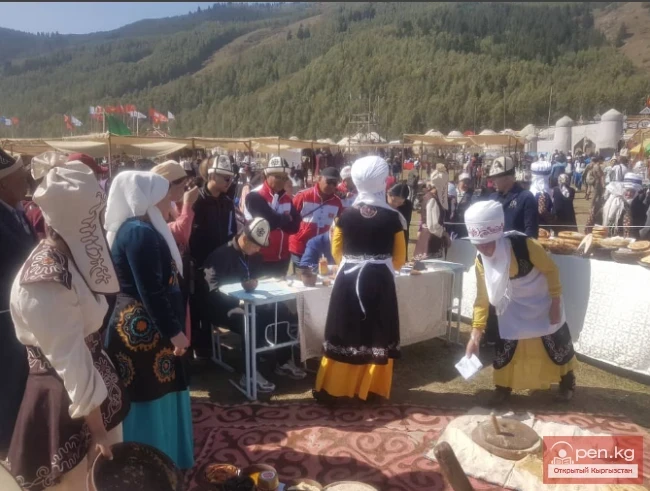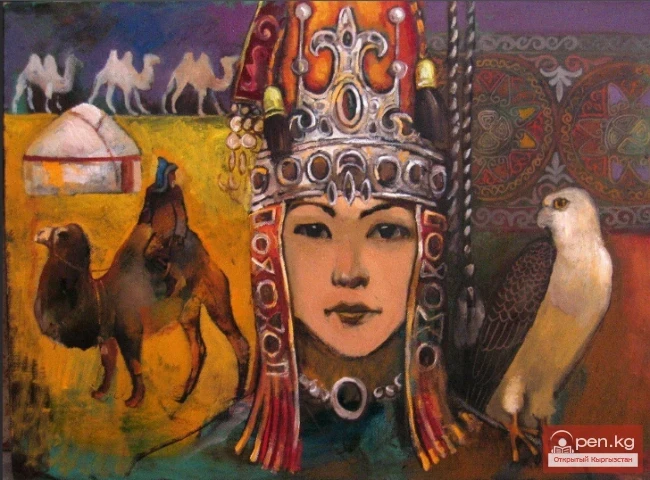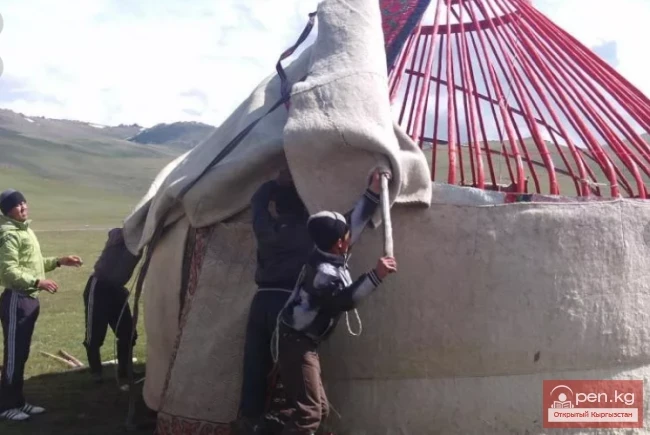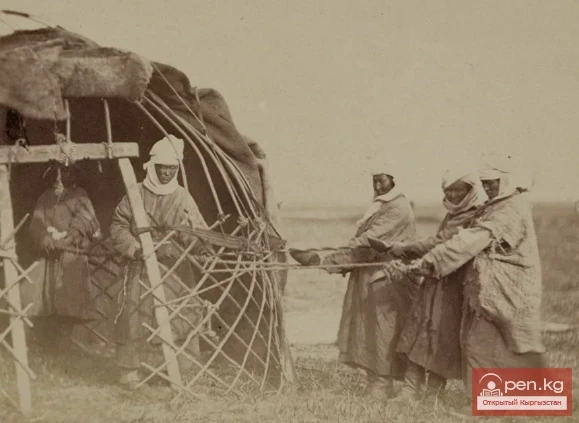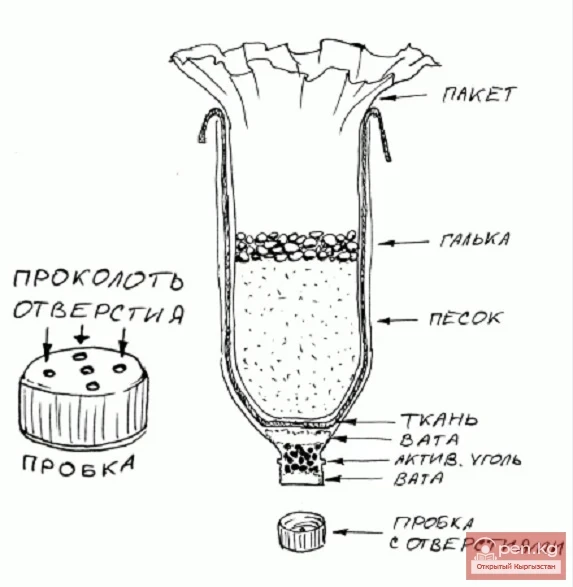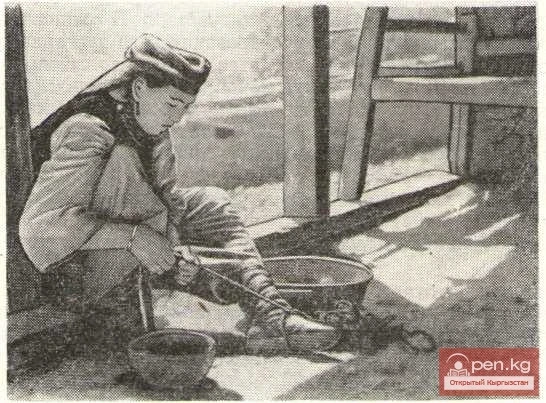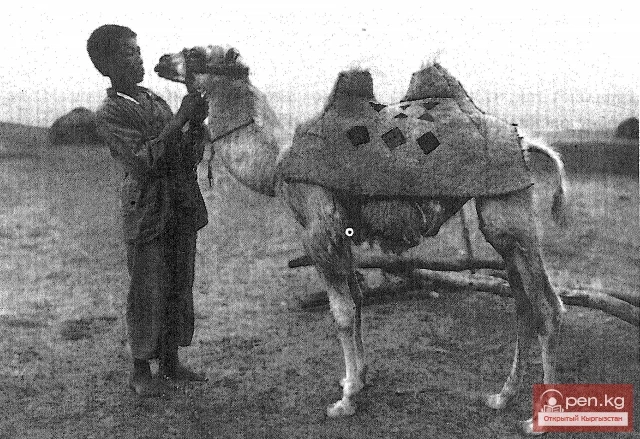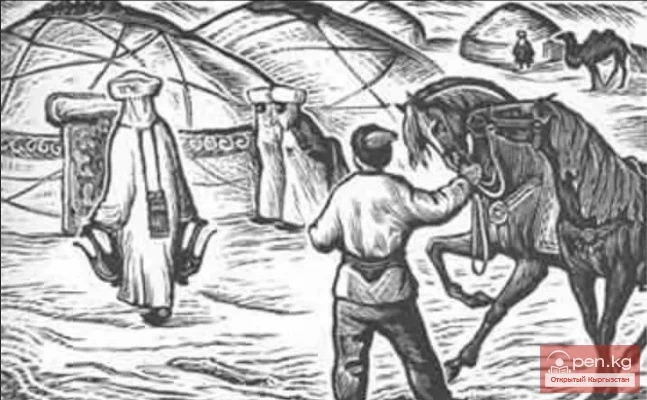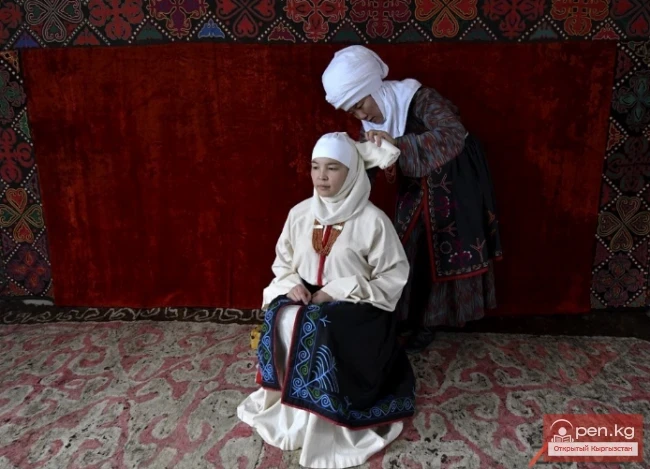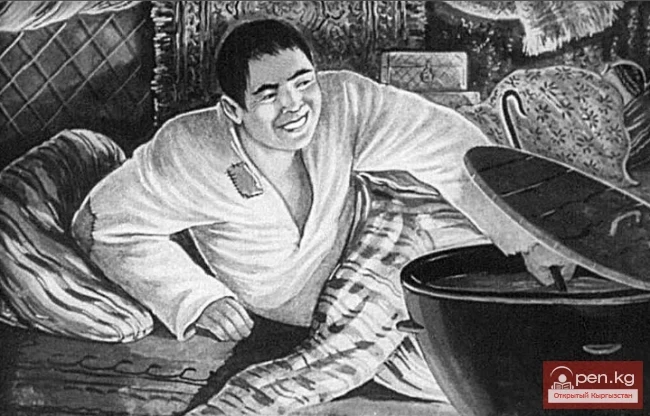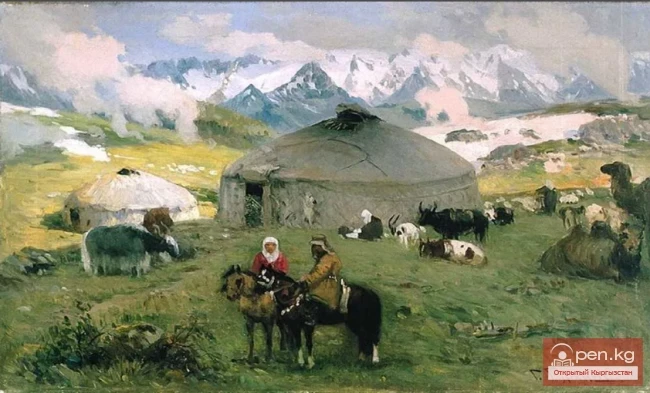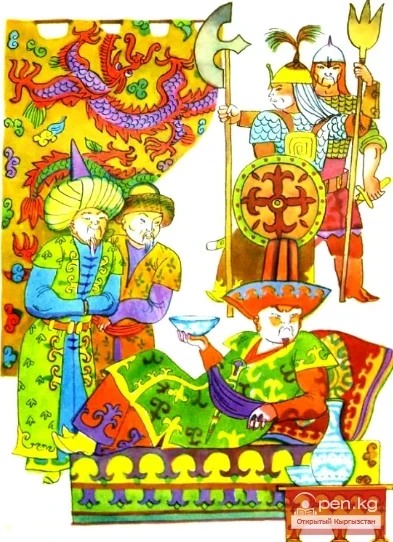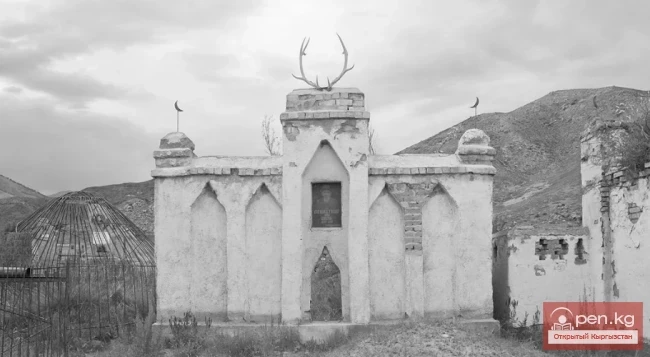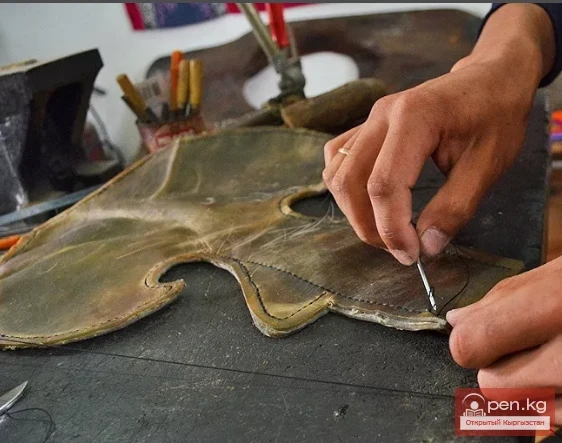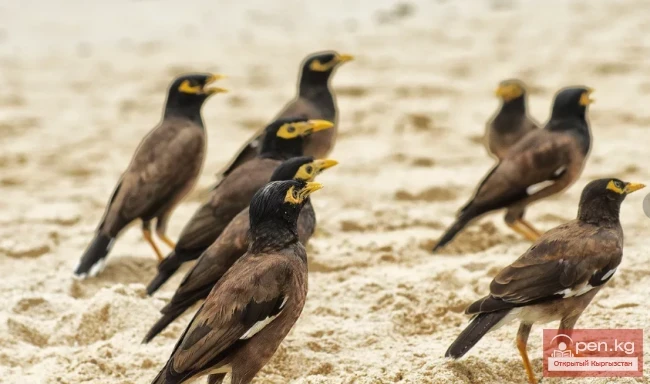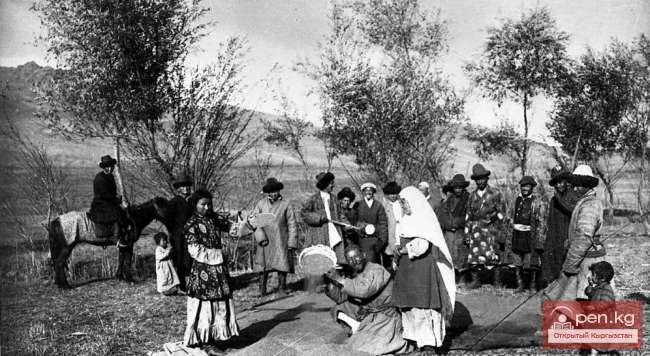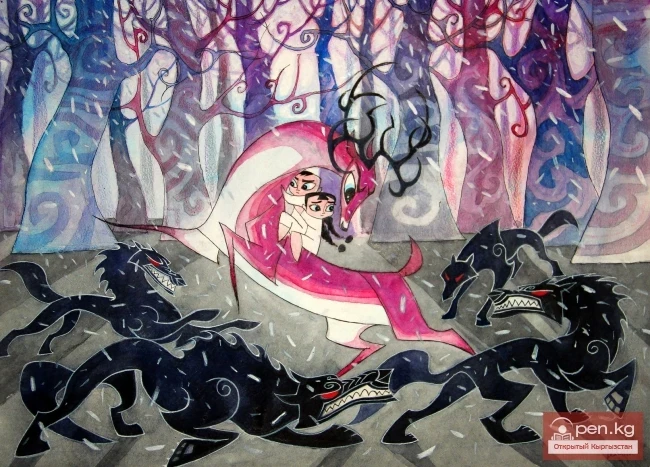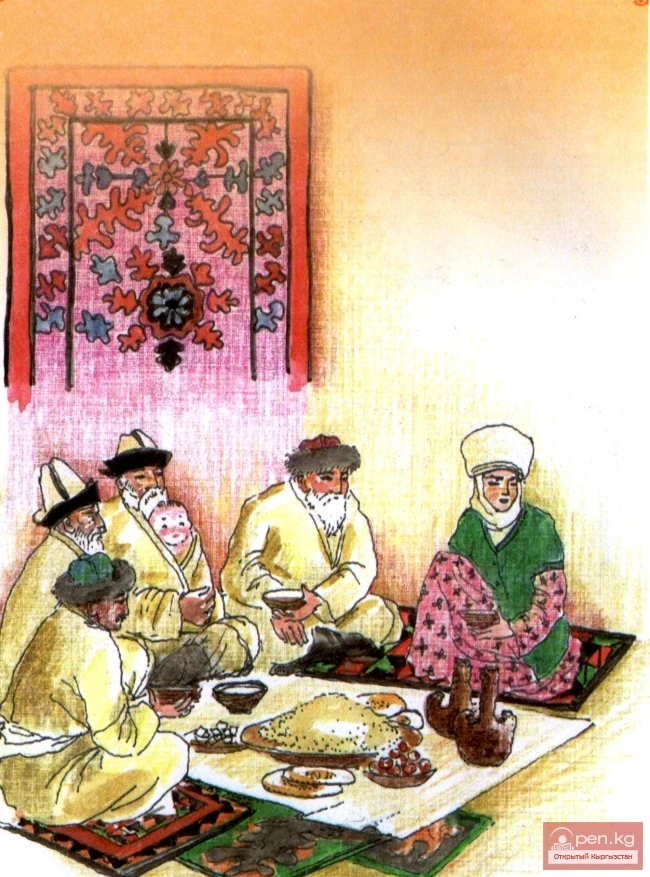OTHER CUSTOMS
Chingish Aji
When a nomadic caravan passes through a foreign aul, it is greeted with kumys or ayran, fried grain, etc.
The resolution of the issue of revenge for murder. A stick is taken at the command of the elders, and two people hold it by the ends. Along with the stick, they hold a two- or three-year-old bull. The stick is cut in half, while simultaneously cutting off the tip of the bull's tail. The stick and the piece of tail are thrown away, and the bull is taken by the one who cut the stick. The people involved in this act are witnesses to the final resolution of the dispute, which cannot be raised again afterward. This is an ancient custom.
Bozbashtyk
When setting up a new yurt (not a wedding one) to replace a spoiled old one, they perform a sacrifice, although not always: they cut one large livestock animal, and no special prayer is said, except for the usual bata.
A wife's infidelity in ancient times was punished by cutting her in half, throwing one half of the body to one side and the other half to the other side of the road, and then moving on, passing in the middle beside the corpse of the executed.
There was such a custom. If during a battle or under other circumstances a bullet from a gun hit a person and could not be removed, the wounded person would lie down, and a woman was asked to step over him (kathin chin zholdash — "woman is the true companion"). If the invited woman was honest, a faithful wife, then the bullet would, by the second or at least the third time, jump out of the patient's body by itself. All women agreed to this, which showed their high morality in ancient times. Such a woman would not walk with anyone, neither as a girl nor as a young woman. If the bullet does not come out, it means the woman is dishonest. In such cases, to avoid public disgrace, the unfaithful wife would hide in advance.
There is no prohibition against killing any animal for certain Uruqs. According to Muslim laws, it is forbidden to kill a stork and a whale. The latter is because Jonah (Junus) was in the belly of a whale. The hoopoe (sasyk u pup) cannot be killed by all Kyrgyz.
Bozbashtyk Aji
In the case of a dispute, they performed chybyq kyrkyldy1. Two people hold a stick by the ends, and with one knife, holding it together, each cuts it with their free hand. For this, they received one tay'u or kunan'u each, and were obliged to always testify that the dispute was resolved.
In the case of accusing someone of a crime, the accused, if he considers himself innocent, had to take an oath according to known rules on a special mound, near which there was a guard. It was the guard's duty to watch (without showing himself) that the oath was taken correctly. After taking the oath, for a whole year, he was not allowed to enter someone else's yurt. People did not greet or talk to him. He could only communicate (and enter) with relatives. Such a person was looked upon with disdain even after a year when he began to appear in other people's homes and among people without special permission. This was the case when the Kyrgyz lived mixed with the Kalmyks.
In the case of murder or large theft, if suspicion fell on a particular person (or group), he was offered to take an oath to prove his innocence. If the accused felt strong, he refused the oath. Then both sides agreed: they selected one person from each side, cut a living torpok2 into pieces, expressing thereby a desire and agreement for the guilty to undergo the same fate in the afterlife. Those who cut received one camel or a medium horse as jurors in resolving the dispute.
Kukumbyai Zhin
After taking the oath, the one who swore returns home and there cuts a living torpak and also a kid; the meat is given to the poor (denies the previous description).
The oath was often required not from the suspect in murder or theft, but from an honorable person, under whom the suspect was. This greatly damaged his reputation, and although people still talked to him, they looked at him sideways. For a certain time, out of shame, he did not go to people, kept to himself. After the oath, he had to first enter his yurt and only then had the right to enter others. He was not driven away by those he visited, but they treated him not very warmly.
Satyvaldy
On Thursdays, for the aruakha, they make flatbreads and other food with oil or fat to create a smell. While treating guests, they perform bata for the deceased. If this is done, the aruakha promises a long life, and so it is always, without a time limit.
trans. Sandyq Tengri berken
At the first thunder, women take a bucket or a horse, hit it with a ladle, and walk around the yurt — dambyr tash3; this marks the beginning of summer.
Sarybulak
In the yurt, the neck (a piece of spine) of a ram or lamb is stuffed behind the kerige: to make the owners' teeth stronger. The cooked neck is gnawed with teeth only, without using a knife. During the migration, it is stuck on a stick, which is then stuck in the hearth, so that some dog will take it away — the child's neck will be stronger.
Chonur-Talas
kainazar
They take a stem of chia, break it in half (without tearing it into two parts), pass a long piece of white cloth inside at the break, folding it in half. Then they wrap this end over the folded stem to the end of the cloth, glue the end with saliva, and place this item under the armpit with the head up. In case of a supposed failure, when the cloth is unfolded again, it will be found that not only the lower half, turned to the right, but also the upper half (? — F.F.) is captured at the bend of the cloth.
When divining with alchiks — (Kyrgyz chukyo, Kazakh ashiq): 1) alchy or aikur (the concave side of the bone) — qualitatively better; when applied to determine a person — a king, khan; 2) taa (the opposite side) — bad, unfortunate; a person — a thief or a donkey; 3) bogyo (the upper side) — "thick"; a person — honest; 4) chige (the lower side) — a feminine nature in a man.
During a battle, the commander, standing on a horse, throws an alchik on a drum (Persian) and divines. If the first position comes out — victory, if the third — peace, if the fourth — peace in favor of the enemies, if the second — defeat, and if onghko, i.e., the alchik stands on its head — eternal slavery to the enemies (very rare).
When they cut a ram in autumn, if the stomach feels tightly filled, hard, it means the winter will be good for the livestock; if soft, it is a bad sign, and they need to migrate to another place for wintering, where there will be less snow.
When during rain the wind blows from the west, it is necessary to drive the herds to the west and graze them. If this is done, the winter will be good. If the rams cannot walk and graze against the wind, it means the winter will be bad.
Comments:
1 Chybyq kyrkyldy — literally, "the stick (twig) was cut."
2 Torpok — "calf" (Yudakhin K.K. Referenced work. P. 753).
3 Dambyr tash — a female incantation at the first spring thunder to invoke an abundance of grass and milk. Women with milking pails circled the yurt three times and shouted: "Zher ayrilyp, kbk chyk! Zhelin ayrilyp, sut chyk!", i.e., "Open up, earth, and let the grass appear! Open up, udder, and let the milk appear!" (Yudakhin K.K. Referenced work. P. 183).
Games of the Kyrgyz in the early 20th century
